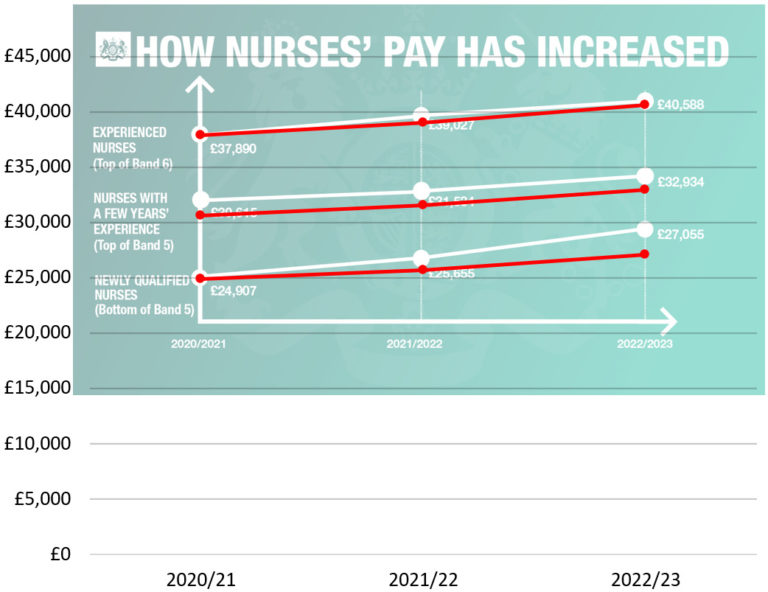The Department of Health and Social Care has been criticised by the UK Statistics Authority for a “poor and misleading” tweet showing the change in nurses’ wages over the last two years.
The department posted a tweet on 10 November, which at the time of publication it has not taken down, saying nurses have received “a pay rise of at least £1,400 this year, on top of a 3% increase last year”.
The tweet, which was published the day after the Royal College of Nursing announced that staff across the UK had voted to take strike action over pay and patient safety concerns, included a chart showing the change in average pay from 2020-21 to 2022-23.
MP Andrew Gwynne raised concerns with UKSA, arguing the chart was misleading in how it was drawn – partly because its y-axis does not start at zero and partly because the slopes of the lines do not appear to reflect the underlying figures.
UKSA chair Robert Chote, responding to the Labour MP’s complaint yesterday, said: “I agree that this is a poor and misleading representation of the underlying data that risks damaging public confidence in the presentation of official statistics by the department.
“Beginning the y-axis at around £20,000 exaggerates the proportionate increase in pay over the period and for this type of reason, breaks in axes of this sort should usually be avoided or at least shown transparently in the way they are labelled and formatted.
“In addition, as shown below, the freehand way in which the lines appear to have been drawn suggests a bigger relative increase in pay for newly qualified nurses and a bigger pay premium for “a few years’ experience” than the underlying data justify.”
UKSA chart adaptation showing its "misleading" nature

Chote said the “shortcomings” of the chart underline how important it is that political and communications teams within departments consult and listen carefully to their heads of profession for statistics before publishing high-profile numbers or data visualisations of this kind.
“Failure to do so can undermine public confidence in the outputs of the department and in the presentation of official statistics more broadly,” he said.
Gwynne also said it was “disingenuous to claim that nurses have been awarded a pay rise”, by focusing on particular points in nurses’ pay bands and comparing cash figures between 2020-21 and 2022-23, rather than inflation-adjusted figures over a longer period.
However, Chote disagreed with this assessment, saying: “It is perfectly reasonable to debate whether cash or real-terms figures are a more appropriate basis for comparison, and what time period and points in the pay bands should be used, but the chart is not in itself misleading in this regard.”
But he added that the department should have shared a link to the source data for the chart to allow readers to “understand the precise definitions used, verify the figures and put them in a longer-term context”.
Chote said the Office for Statistics Regulation – UKSA's regulatory arm – has raised this issue with the department, which “intends to publish a blog explaining the basis for the figures used”.
The UKSA chair has sent the letter outlining his concerns to both DHSC and the chief executive of the Government Communication Service.
Royal College of Nursing general secretary Pat Cullen described Chote's letter as “damning” and urged ministers to "come clean" about nurses' pay.
"Sir Robert Chote has used the strongest terms here to cut through the government’s spin... The government’s figures did not fool nursing staff who are sharing very difficult stories of personal financial hardship," she said.
A DHSC spokeperson said: “All of the figures are accurate but we accept the data could have been presented more clearly.
“We are committed to using data accurately and transparently.”
The spokeperson did not respond to CSW 's query about whether the department was planning to take the tweet down following Chote's comments.
Up to 100,000 nurses in in England, Northern Ireland and Wales will walk out on 15 and 20 December. The RCN is calling for a pay rise of 5% above the Retail Price Index measure of inflation, which stood at 14.2% in October.
The RCN said this year's pay award, which is £1,400 for most nurses, would leave experienced nurses 20% worse off in real terms following successive below-inflation awards since 2010.